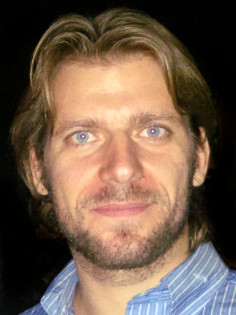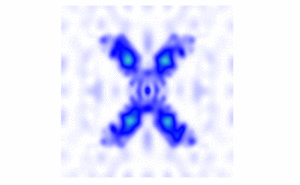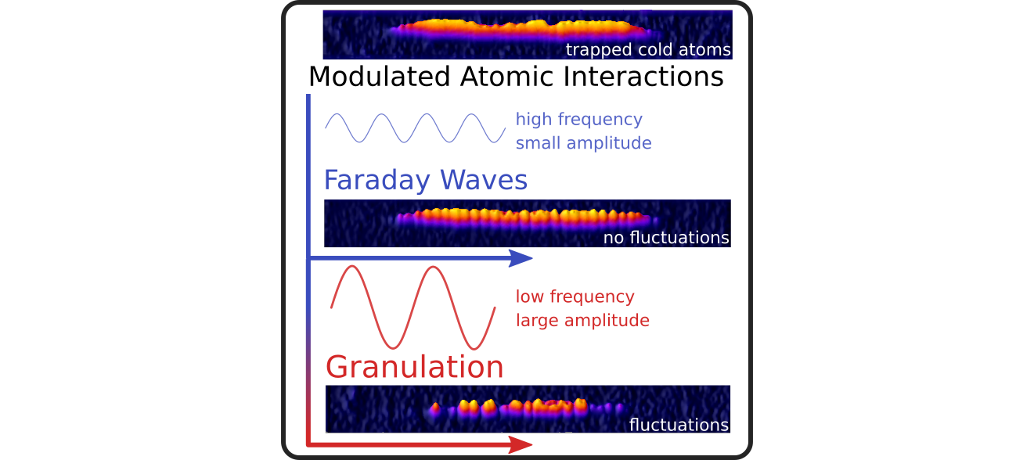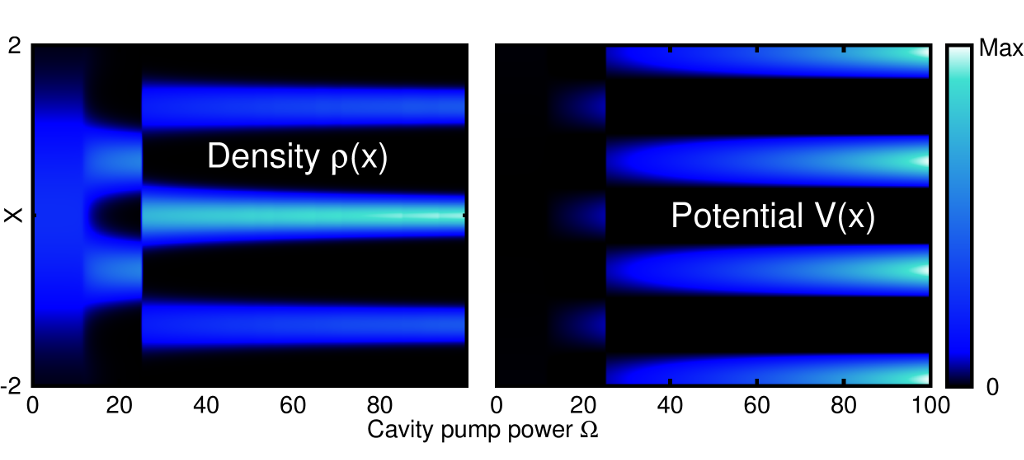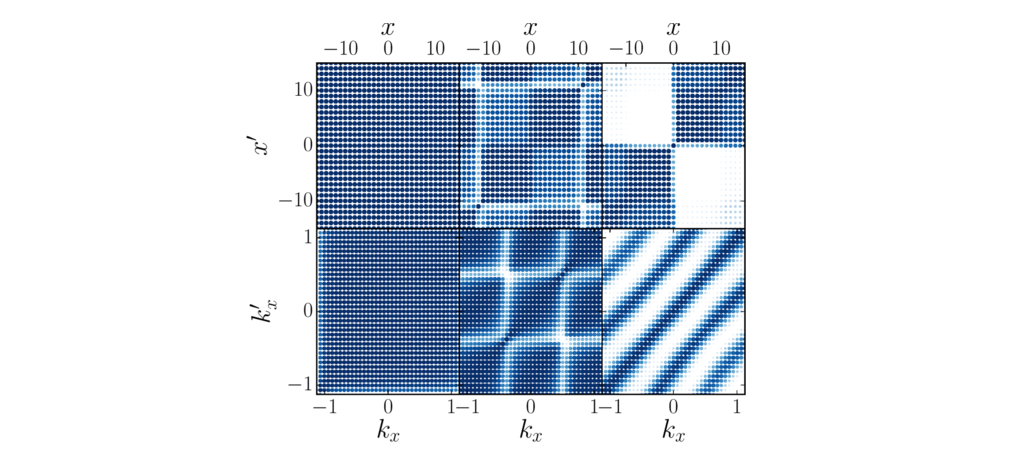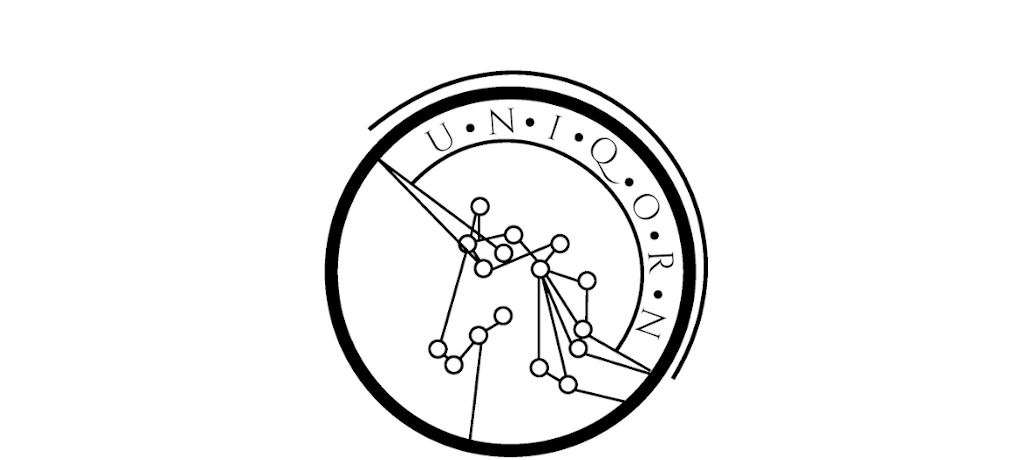Dr. Marios C. Tsatsos
Â
|
 |
Â
Work
- Research Associate at the Sao Carlos Institute of Physics, University of Sao Paulo. FAPESP grantee, 2014-present.
- Visiting researcher at TU Wien and University of Vienna (2017) and National Autonomous University of Mexico (2012).
- Research assistant at the University of Heidelberg (2008-2011).
Â
Education
- Doctor of Science (Dr. Rer. Nat.), Heidelberg University, Heidelberg (Germany) 2012.
- M.Sc. in Theoretical Physics, Imperial College London (UK) 2007.
- B.S. in Physics Aristotle University of Thessaloniki, Thessaloniki (Greece) 2006.
Â
Â
Research interests
Â
Development and Applications of the MCTDH-X package
MCTDH-X is a modern implementation of the MultiConfigurational Time-Dependent Hartree method for indistinguishable particles X. It is a program to numerically solve the time-dependent many-body Schrödinger equation for Hamiltonians with generally time-dependent or time-independent one- and/or two-body potentials for bosons or fermions. A graphical user interface facilitates the usage of the MCTDH-X package. For further reading and download click here.
Â
MCTDH-X: A general environment for all Interacting Ultracold Many-Body Systems
MCTDH-X is a powerful tool that applies the MCTDH theory to solving problems of interacting bosons and fermions. It is so general that it can be applied to a series of situations, like trapped bosons and Bose-Einstein condensates, bosons with spin, bosons interacting with a light cavity (cavity QED), interacting fermions trapped or not and more. The MCTDH is a numerically exact theory that can describe correlation functions and their time evolutions, probability densities, simulate single shots and give accurate predictions for the dynamics of quantum systems, currently studied in various laboratories.
Â
Correlations, fluctuations and all that
In the core of quantum mechanics lays the uncertainty: for a given system of quantum-mechanical particles one can know the distribution of the possible (real-space or momentum-space) positions, while a measurement while pick a random value from this distribution. This very fact underpins all quantum systems, including ultracold many-body systems and Bose-Einstein condensates too. Even though somewhat overlooked, fluctuations (i.e. differences from measurement to measurement) can stabilize various many-body structures that are other wise elusive. A mean-field theory (as for instance, the Gross-Pitaevskii theory) cannot estimate neither fluctuations nor correlations, vital in many-body configurations. MCTDH-X can simulate quantum correlations of all orders and its dynamics in time. Recently, we have found cases where BECs are in the need of beyond-mean-field descriptions where quantum fluctuations do play an important role. Such an example are the granular states, which are stabilized through many-body interactions and correlations.
Â
Vortices, Solitons and their Interactions
Motivated by recent progresses in vorticity and the study of quantum turbulence in BECs myself and collaborators have used MCTDH-X in order to see the fate of vortices initially imprinted in gaseous Bose-Einstein condensates (BECs). We seed a vortex or two and let them propagate in time. We ask what happens to the crossing and reconnection of vortex lines for varying trap anisotropies. MCTDH-X showed that - besides the traditional known way two vortex lines can reconnect - there is no more reconnection type, for trap geometries oblate enough.
Â
Â
Analytically Finding Many-Body States of Exact Angular Momentum
An older (PhD) project of mine was to determine the conditions under which 2D and 3D attractive trapped Bose-Einstein condensates will collapse or not. The finding was that angular momentum (AM) can stabilize the state. To show so, I figured out how to expand the exact eigenstates of the total Lz and L^2 operators on a basis of orbitals of well-defined orbital angular momentum. Interestingly, the state of well defined quantum numbers of the operators Lz and L^2 of the total AM are generally fragmented. This result can stand out alone and used beyond the context of attractive BECs, as many-body states of total AM were not described before.
Â
Â
Activities
Â
Workshops / Conferences
- BEC 2017, Sant Feliu, Spain, 2017.
- Annual workshop of the High-Performance Computer Centre (HLRS) of Baden-Wuerttemberg (world top 20 supercomputer), Stuttgart, Germany, 2017
- MCTDH workshop, Paris, France (invited), 2017.
- Low Temperature Physics LT28, Gothenburg, Sweden, 2017.
- ICAP 2016, Seoul, S. Korea, 2016.
- Coherent Structures in PDEs and their Applications, Oaxaca, BIRS, Mexico (invited), 2016.
- Tecnolaser conference, Havana, Cuba (International Program Committee), 2016.
- Topological Effects in Ultra-Cold Atoms, IIP Natal, 2016
- Quantum Non-equiibrium phenomena, IIP Natal, 2016
- CoScaLi, Ubatuba, 2016
- Emergent paradigms in nonlinear complexity, Santa Fe and Los Alamos National Lab, U.S.A. (invited), 2015.
- IEA Workshop On Bose-Einstein Condensation and Quantum Chaos, Sao Paulo, 2015.
- “Quo Vadis BEC? V”, Bad Honef, Germany. Poster contribution, 2014.
- Quantum Fluids Gases and Solids, Sao Carlos, Brazil (Organizing Committee), 2014.
- Critical Stability, Santos, Brazil. Talk contribution, 2014.
- Laser Physics 14, Sofia, Bulgaria. Talk contribution, 2014.
- Low Temperature LT27, Buenos Aires, Argentina. Poster contribution, 2014.
- American Physical Society (APS) annual meeting, Boston, MA. Talk contribution, 2012.
- German Physical Society (DPG) annual meeting, Dresden, Germany. Talk contribution (Q 10.8), 2010.
- “Quo Vadis BEC? III”, summer school and workshop, Dresden, Germany. Poster contribution, 2010.
- Balkan Physics Society, annual meeting, Bodrum, Turkey. Poster contribution, 2006.
 Seminars
- AtomInstitut, TU Wien, 2017.
- MCTHD international School, Paris, 2017.
- Department of Physics, University of Oxford, 2017.
- Condensed Matter Theory & Quantum Computing group, University of Basel, 2015
- Center for NonLinear Studies, Los Alamos National Laboratory, 2015.
- Atomcool, Rice University, 2015.
- Condensed Matter Theory group, University of Texas at Austin, 2015.
- Institute of Physics, UNAM, 2014.
- Lectures on mean-field theories for Bose-Einstein condensates, IFSC-USP, 2014.
- Institute of Physics, USP, 2014.
- Institute of Physics, UNAM, 2012.
- Department of Mathematics and Statistics, University of Massachussetts at Amherst, 2012.
- School of Physics, Georgia Tech, 2012.
- Atomic-Molecular-Quantum Seminar, Heidelberg University, 2010.
Â
Grants/Awards
- Post-doctoral grant from FAPESP (Funding agency of the state of Sao Paulo), 2014.
- STIBET Grant by the German Academic Exchange Service (DAAD) for International Doctoral Candidates, 2011.
- Doctoral Fellowship through the Landesgraduierteförderung - LGFG, (funding program of the state of Baden-Württemberg), 2007.
- Imperial College Hardship fund, 2007.
Â
Projects
- UT Austin-FAPESP 2016/50033-0 “Development of a New Method to Cool Neutral Atoms and its Appication Towards the Study of Quantum Turbulence”, 120K USD.
- Ultracold.org. Website and online platform where the efficient software MCTDH-X on many-body dynamics of quantum systems can is available. Website containing a discussion forum with >50 registered users and also popular presentation of recent scientific achievements. 2K USD fundraised.
- FAPESP regular program 19096-8 “Dynamics of vortices in ultracold quantum gases of bosons: many body states in systems of few particles and vortices carrying multiple charge”. ~100K USD.
- FAPESP technology innovation program 07276-1. PI: V. S. Bagnato.
- “Intermolecular Coulombic Decay and control of photoinduced processes in physics, chemistry, and biology”, funded by the European Research Council under the European Community’s Seventh Framework Programme No. FP7 /ERC. Advanced Investigator Grant No. 227597. PI: L.S. Cederbaum.
Computational resources at the HLRS, Stuttgart.
Â
Miscellaneous
I compose and play music (clarinet and saxes) in my free time. Samples here.
Â
Hits: 29253
